Episodes

Thursday Mar 27, 2025
Let's Start With a Home | EP.2 | "Housing First: From Paper to Reality"
Thursday Mar 27, 2025
Thursday Mar 27, 2025
Housing First is an alternative to traditional homelessness services that shifts the focus, prioritising immediate access to a decent home as a starting point.
By providing a stable home from the outset, this model has proven that it reduces homelessness while also significantly improving people's physical and mental health.
Throughout this episode, we will explore the bridge between the policy of Housing First (on paper) and its actual implementation and impact on people's lives (reality).

Thursday Feb 27, 2025
Let's Start With a Home | EP.1 | "The foundations of Housing First"
Thursday Feb 27, 2025
Thursday Feb 27, 2025
Housing First is an alternative to traditional homelessness services that shifts the focus, prioritising immediate access to a decent home as a starting point.
By providing a stable home from the outset, this model has proven that it reduces homelessness while also significantly improving people's physical and mental health.
But what led to the development of this groundbreaking model?
Throughout this podcast, we will take a closer look at Housing First. We will talk with experts on this model; from individuals who are using Housing First services themselves to policy experts and service providers. They will help us understand what HF is, and its ambition to enact the right to a decent home for everyone.
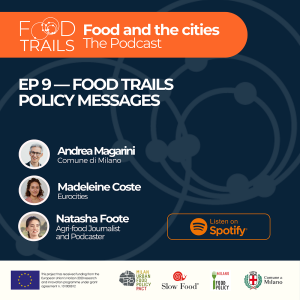
Thursday Dec 05, 2024
Food and the cities. From policy to plate. Episode 9/9: Food Trails policy messages
Thursday Dec 05, 2024
Thursday Dec 05, 2024
In this episode of ‘Food and the cities’ we delve into the essential policy messages from the Food Trails project.
Join our host, Natasha Foote, as she engages with Madeleine Coste, head of Food Policy and Projects at Eurocities, and Andrea Magarini, Director of the Food Policy Department at the City of Milan. Andrea also serves as Chair of the Eurocities Working Group Food, works within the framework of the Milan Urban Food Policy Pact, and is the coordinator of the Food Trails project.
Together, they will discuss:
-
The main policy recommendations emerging from the Food Trails project.
-
How the EU can enable cities to move forward.
-
Placing food democracy at the heart of EU policies.
This podcast is brought to you by Comune di Milano and Slow Food as part of the EU Horizon 2020 Food Trails project.
Food Trails is an Eu Horizon 2020 project involving a consortium of 11 European cities, 3 universities, and 5 food organizations, aiming to make lasting and evidence-based progress towards more resilient, safe, fair, and diverse urban food systems across Europe. Through Food 2030-led Living Labs, Food Trails cities co-designed and co-implemented food actions, enabling systemic urban food policies development.
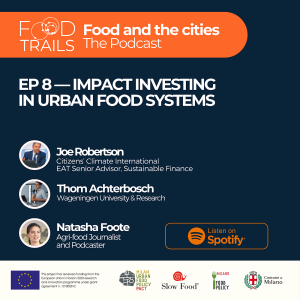
Thursday Dec 05, 2024
Thursday Dec 05, 2024
As Joe Robertson states, "Impact investing is a critical tool for correcting market failures. It can feel like swimming against the tide, but it's really about being honest about value creation."
In this episode of Food and the Cities, we explore how impact investing can drive positive social and environmental change in urban food systems.
Join our host, Natasha Foote, as she engages with Joe Robertson from Citizens’ Climate International, Senior Advisor of Sustainable Finance at the EAT Foundation, co-leader of the Food Trails Impact Investors Living Lab and the Good Food Finance Network, alongside Thom Aachterbosch, researcher on food systems transformation at WUR - Wageningen University and Research.
Together, they will discuss:
- What is impact investing, and why is it essential for urban food systems and policies?
- How can cities focus on impact investing, and which investments should be scaled?
- Insights and outcomes from the ‘Food Trails Impact Investors Living Lab’
This podcast is brought to you by the Comune di Milano and Slow Food as part of the EU Horizon 2020 Food Trails project.
Food Trails is an Eu Horizon 2020 project involving a consortium of 11 European cities, 3 universities, and 5 food organizations. Its goal is to promote more resilient, safe, fair, and diverse urban food systems through co-designed actions in Food 2030-led Living Labs, enabling the development of systemic urban food policies.
Useful links:
- Food Trails Policy Brief “Budgeting Urban Food Policies”
- Impact Investors Living Lab “Overview and Roadmap for Scaling Impact Investment in Urban Food Systems”
- Policy Brief "Impact Investment in urban Food systems"
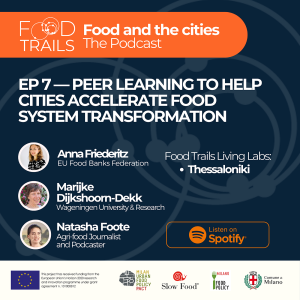
Thursday Dec 05, 2024
Thursday Dec 05, 2024
"Instead of starting from scratch, collaboration allows us to learn from each other and leverage synergies," notes Anna Friederitz.In this episode of Food and the Cities, we explore how peer learning can accelerate food system transformation.
Join our host, Natasha Foote, as she engages with Anna Friederitz, Network Development Coordinator at the European Food Banks Federation (FEBA), and Marijke Dijkshoorn-Dekker, Senior Researcher at Wageningen University (WUR).
Together, they will discuss:
-
The importance of knowledge exchange and the replication of innovative approaches.
-
Key elements that enable replication and scalability, including drivers and barriers.
-
Strategies for expanding the impact: upscaling and outscaling
Moreover, this episode takes a closer look at one city from the Food Trails project—Thessaloniki—to explore its specific initiatives and the outcomes it achieved.
This podcast is brought to you by Comune di Milano and Slow Food as part of the EU Horizon 2020 Food Trails project.
Food Trails is an EU Horizon 2020 project involving 11 cities, 3 universities, and 5 food organizations. Its goal is to promote more resilient, safe, fair, and diverse urban food systems through co-designed actions in Food 2030-led Living Labs, enabling the development of systemic urban food policies.
Useful links:
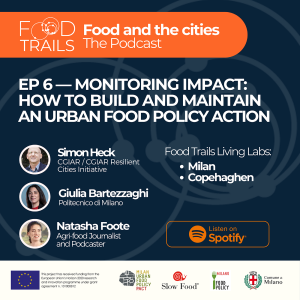
Thursday Dec 05, 2024
Thursday Dec 05, 2024
As Simon Heck aptly puts it, "Data and evidence are very empowering. They help everyone in the food system think beyond today’s individual constraints and look toward the future."
In this episode of Food and the Cities, we explore the importance of monitoring impact and how this can help build and sustain effective urban food policy actions.
Join our host, Natasha Foote, as she engages Simon Heck, Senior Director for Urban Food Systems at CGIAR, the world’s largest agricultural research network, and Giulia Bartezzaghi, Director of the Food Sustainability Lab at Politecnico di Milano School of Management.
Together, they will discuss:
-
Tools for systemic and integrated food policy actions, developed and tested by the Food Trails project cities.
-
The relevance of data collection for urban policy actions.
-
How to design a monitoring system that ensures data collection leads to successful policy outcomes.
Moreover, this episode takes a closer look at two cities from the Food Trails project—Milan and Copenhagen—to explore their specific Living Labs initiatives and the outcomes they achieved.
This podcast is brought to you by Comune di Milano and Slow Food as part of the EU Horizon 2020 Food Trails project.
Food Trails is an Eu Horizon 2020 project involving a consortium of 11 European cities, 3 universities, and 5 food organizations. Its goal is to promote more resilient, safe, fair, and diverse urban food systems through co-designed actions in Food 2030-led Living Labs, enabling the development of systemic urban food policies.
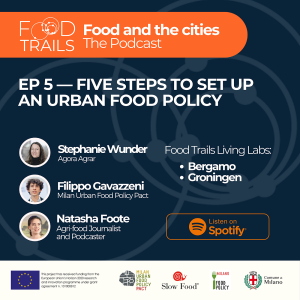
Thursday Dec 05, 2024
Thursday Dec 05, 2024
“Setting up a food strategy is important, but it is just as important that it doesn’t remain just a piece of paper,” says Stephanie Wunder.
In this episode of Food and the Cities, we explore the five essential steps to establishing an urban food policy.
Join our host, Natasha Foote, as she engages with Stephanie Wunder from the independent think tank Agora Agriculture - Agora Agrar, and Filippo Gavazzeni from the Milan Urban Food Policy Pact Secretariat.
Together, they will discuss:
- What we mean by an urban food policy and why cities should have one.
- The five fundamental steps to successfully implement an urban food policy.
- The critical elements of a food policy.
Moreover, this episode takes a closer look at two cities from the Food Trails project—Groningen and Bergamo—to explore their specific initiatives and the outcomes they achieved.
This podcast is brought to you by Comune di Milano and Slow Food as part of the EU Horizon 2020 Food Trails project.
Food Trails is an EU Horizon 2020 project involving 11 cities, 3 universities, and 5 food organizations. Its goal is to promote more resilient, safe, fair, and diverse urban food systems through co-designed actions in Food 2030-led Living Labs, enabling the development of systemic urban food policies.
Useful links:
-
Food Trails D 3.1 (Soon available on the MUFFP website)
-
The Food System Economic Commissions’ global report ‘The Economics of the Food System Transformation’
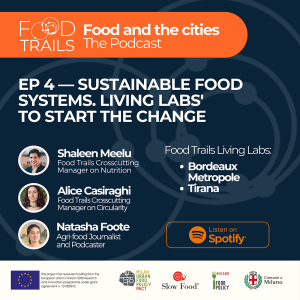
Thursday Dec 05, 2024
Thursday Dec 05, 2024
“Living Labs are an effective method to test innovations in food systems before scaling them to the whole city level,” said Alice Casiraghi.
In this episode of ‘Food and the Cities,’ we explore how setting up of Living Labs can help cities initiate the transition towards more sustainable food systems.
Host Natasha Foote, interviews Shaleen Meelu, public health nutritionist and Food Trails Crosscutting Manager for the ‘Food 2030’ Pillar of Nutrition, and Alice Casiraghi, freelance designer specializing in circular economy and Food Trails Crosscutting Manager for the Circularity Pillar.
Together, they discuss:
- Living Labs and their role in implementing integrated urban food policy actions.
- Food Councils and their significance in driving change.
- Participatory approaches for engaging food system stakeholders.
Additionally, this episode takes a closer look at two cities from the Food Trails project—Bordeaux Metropole and Tirana—to explore their specific initiatives and the outcomes they have achieved.
This podcast is brought to you by Comune di Milano and Slow Food as part of the EU Horizon 2020 Food Trails project.
Food Trails is an EU Horizon 2020 project involving 11 cities, 3 universities, and 5 food organizations. Its goal is to promote more resilient, safe, fair, and diverse urban food systems through co-designed actions in Food 2030-led Living Labs, enabling the development of systemic urban food policies.
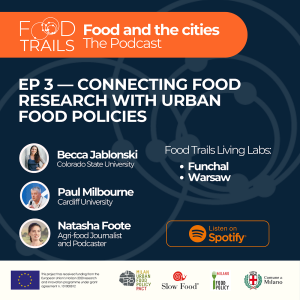
Thursday Dec 05, 2024
Thursday Dec 05, 2024
“It was the process of working together—researchers and policymakers—that resulted in policy changes,” noted Becca Jablonski.
In this third episode of 'Food and the Cities', host Natasha Foote engages with Becca Jablonski, a member of the Food Trails Think Tank, co-Director of the Food Systems Institute at Colorado State University, and Associate Professor in the Department of Agricultural and Resource Economics, and Paul Milbourne, Professor of Human Geography in the School of Geography and Planning at Cardiff University and a researcher with Food Trails.
Together, they discuss:
- How to bridge the gap between researchers and policymakers.
- How the Food Trails project overturned the relationship between research and cities.
- Innovative research frameworks for a better understanding of urban food systems.
Moreover, this episode takes a closer look at two cities from the Food Trails project—Funchal and Warsaw—to explore their specific initiatives and the outcomes they achieved.
This podcast is brought to you by Comune di Milano and Slow Food Europe as part of the EU Horizon 2020 Food Trails project.
Food Trails is an EU Horizon 2020 project involving 11 cities, 3 universities, and 5 food organizations. Its goal is to promote more resilient, safe, fair, and diverse urban food systems through co-designed actions in Food 2030-led Living Labs, enabling the development of systemic urban food policies.
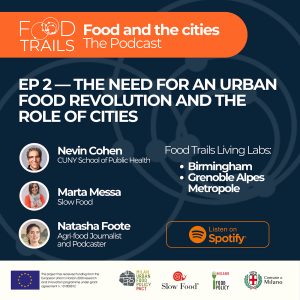
Thursday Dec 05, 2024
Thursday Dec 05, 2024
“Fixing our food system is a way to fix our cities,” says Nevin Cohen.
In this second episode of "Food and the Cities," host Natasha Foote interviews Nevin Cohen, a member of the Food Trails Think Tank, Associate Professor at the City University of New York, and Director of the Urban Food Policy Institute, alongside Marta Messa, Secretary General of Slow Food and a Food Trails expert.
Together, they discuss:
- What we mean by the sustainable transition of urban food systems.
- What the main challenges in urban areas are.
- Why cities are at the heart of the change.
Moreover, this episode takes a closer look at two cities from the Food Trails project—Birmingham and Grenoble Alpes Métropole—to explore their specific initiatives and the outcomes they achieved.
This podcast is brought to you by the Comune di Milano and Slow Food as part of the EU Horizon 2020 project, Food Trails.
Food Trails is an EU Horizon 2020 project involving 11 cities, 3 universities, and 5 food organizations. Its goal is to promote more resilient, safe, fair, and diverse urban food systems through co-designed actions in Food 2030-led Living Labs, enabling the development of systemic urban food policies.
Useful links:
-
Food Trails’ Policy Brief The role of cities in shaping food environments, in the framework of the Eu Farm to Fork strategy

